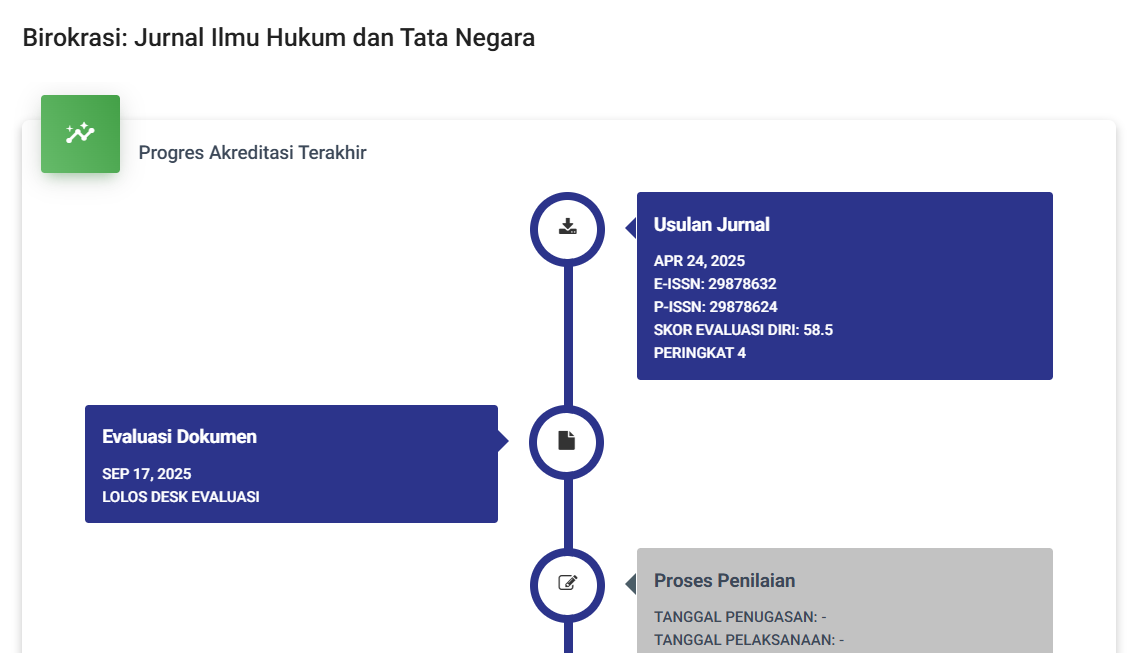Pertanggungjawaban Hukum Kepolisian Yang Melakukan Kealfaan Dalam Tindakan Diskresi Terhadap Tindak Pidana Lalu Lintas
DOI:
https://doi.org/10.55606/birokrasi.v1i2.560Keywords:
Accountability, Disretion, PoliceAbstract
Discretionary actions are the authority of investigators who are decided by the Police in dealing with legal issues ini the field directly and without asking for instructions or decisions from their superiors. The discretion exercised by investigators basically must comply with statutory regulations and the code of ethics for the police profession. However, in reality there is still discrimination in the exercise of police discretion. The aim of the research is to find out the mechanism of impelemntation and legal accountability for the police who do negligence ini traffic discretion. The research method uses normative research conducted using a statutory approach and concepts related to the police. The data used are secondary data ini the form af laws and regulations, books, scientific papers, experts, articles and then these data are processed qualitively. The results of the study show that the mechanism for applying police discretion to traffic crimes at the investigative level is that the police go to the scene of a traffic accident and then make a sketch af the crime scene, help the victim, record witness, secure avidence, the police make a case analysis and exercise discretion in case of an accident, light. The discretionary authority of the police causes investigators to have the authority to make decisions or choose various actions in resolving the law violations they handle. The discretionary authority og the police which is individual in nature is the resolution of traffic accident cases by way of deliberation between the parties involved in the accident. Criminal liabity for negligence by members of the Indonesian National Police is based on article 359 of the Criminal Code, it is proven that the actions of the defendant because of thin negligence caused another person to die is punishable by imprisonment for a maximum of five years of imprisonment for a maximum of one year.
References
Buku-Buku
Abdussalam, H.R., 2009, Hukum Kepolisian Sebagai Hukum Positif dalam Disiplin Hukum, Restu Agung, Jakarta
Ali, Zainuddin., 2019, Metode Penelitian Hukum, Sinar Grafika, Jakarta
Arief, Barda Nawawi., 2008, Mediasi Penal Penyelesaian Perkara Diluar Pengadilan, Pustaka Magister, Semarang
Ariman, H.M. Rasyid dan Fahmi Raghib, 2015, Hukum Pidana, Setara Press, Malang Darumurti, Krishna Djaya., 2016, Diskresi Kajian Teori Hukum, Genta Publishing, Yogyakarta
Ediwarman, 2015, Monograf Metodologi Penelitian Hukum, Panduan Penulisan Skripsi, Tesis, dan Disertasi, Sofmedia, Medan
Fajar, Mukti & Yulianto Achmad, 2012, Dualisme Penelitian Hukum Normatif dan Empiris,
Pustaka Pelajar, Yogyakarta
Hadi, Sutrisno., 2019, MetodologiRiset, Andi Offset, Yogyakarta
Marzuki, Peter Mahmud., 2013, Penelitian Hukum, Edisi Revisi, Kencana Prenada Media Group, Jakarta
Pane, Musa Darwin., 2017, Pengganti Kerugian Negara dalam Tindak Pidana Korupsi: Alternatif pengganti Pidana Penjara dan Pidana Mati dalam Perspektif Pemberantasan Korupsi, Logos Publishing, Bandung
Rahardjo, Satjipto., 2006, Membedah Hukum Progresif, Kompas. Jakarta
Rahardi, Pudi., 2012, Hukum Kepolisian, Kemandirian, Profesionalisme dan Reformasi Polri, Laksbang Grafika, Surabaya
Sadjijono, 2008, Mengenal Hukum Kepolisian, Laksbang Mediatama, Surabaya
Sinamo, Nomensen., 2010, Metode Penelitian Hukum dalam Teori dan Praktek, Bumi Intitama Sejahtera, Jakarta
Soekanto, Soerjono & Sri Mamudji, 2003, Penelitian Hukum Normatif Suatu Tinjauan Singkat,
Raja Grafindo Persada, Jakarta
Sugiono, 2009, Metode Penelitian Kuantitatif, Kualitatif dan R&D, Alfabeta, Bandung
Susanto, F. Anton., 2012, Kepolisian dalam Upaya Penegakan Hukum di Indonesia, Rineka Cipta, Jakarta
Peraturan Perundang-undangan
Undang-Undang Dasar Negara Republik Indonesia Tahun 1945; Kitab Undang-Undang Hukum Pidana;
Undang-Undang Nomor 8 Tahun 1981 tentang Hukum Acara Pidana;
Undang-Undang Nomor 2 Tahun 2002 tentang Kepolisian Negara Republik Indonesia; Undang-Undang Nomor 22 Tahun 2009 tentang Lalu Lintas dan Angkutan Jalan
Peraturan Kepala Kepolisian Negara Republik Indonesia Nomor 14 Tahun 2011 tentang Kode Etik Profesi Kepolisian Negara Republik Indonesia
Peraturan Kepala Kepolisian Negara Republik Indonesia Nomor 10 Tahun 2012 tentang Pengaturan Lalu Lintas Dalam Keadaan Tertentu dan Penggunaan Jalan Selain Untuk Kegiatan Lalu Lintas
Jurnal/Artikel/Tesis
Adnyani, Ni Ketut Sari., Kewenangan Diskresi Kepolisian Republik Indonesia Dalam Penegakan Hukum Pidana, Jurnal Ilmiah Ilmu Sosial Volume 7, Number 2, Desember 2021
A. Raharjo & Angkasa, Profesionalisme Polisi Dalam Penegakan Hukum, Jurnal Dinamika Hukum, Vol. 11 No. 3, 2011
Haji,S. dan Gunarto, Implementasi Kewenangan Diskresi Kepolisian Dalam Penanganan Tindak Pidana Di Polres Demak Jawa Tengah. Jurnal Hukum Khaira Ummah, 2018
Putranto, Ferdi Ramadhan dan Rehnalemken Ginting, Pelaksanaan Diskresi Kepolisian Dalam Penyelesaian Kasus Kecelakaan Lalu Lintas, Jurnal Recidive Vol. 3 No. 3 September-Desember 2014
Rahardjo Yogie., Penerapan diskresi kepolisian dalam pelaksanaan pasal 291 ayat (1) Undang- undang RI No. 22 Tahun 2009 Tentang Lalu Lintas Dan Angkutan Jalan, Tesis, Program Pasca Sarjana, Fakultas Hukum Universitas Indoneisia, Jakarta, 2012
Rudianoro, Joko., Diskresi Kepolisian dalam Mengatasi Tindakan Anarki diMasyarakat, Jurnal IUS: Kajian Hukum dan Keadilan, 2014
Said, Abbas., Tolak Ukur Penilaian Penggunaan Diskresi oleh Polisi dalam PenegakanHukum Pidana, Jurnal Hukum dan Peradilan, Volume 1, 2012
Samijo, PertanggungJawaban Diskresi Kepolisian, Tesis, Program Studi Magister Ilmu Hukum Program Pasca Sarjana Universitas 17 Agustus 1945 Surabaya, 2011








